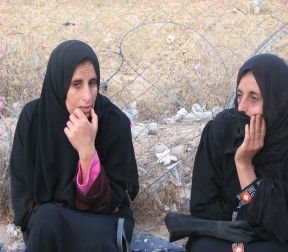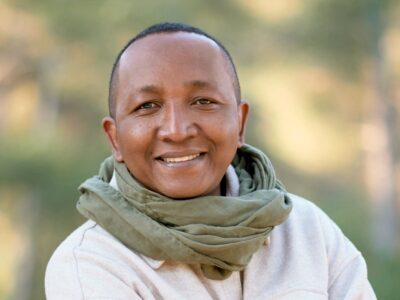(Lahatsoratra teny anglisy efa tamin'ny volana Jolay 2007)
Na dia resaka politika tahaka ny mahazatra aza adihevitra maro ao amin'ny tontolon'ny blaogy Palestiniana, nanapa-kevitra ny hiova hevitra aho amin'ity herinandro ity. Raha tokony ho governemanta sy Gaza ary ny patriarika, ny fiodinana amin'ity herinandro ity dia hijery ny ny lohahevitra isan-karazany – lohahevitra momba ny vehivavy aho.
Ny voalohany dia ny tantaran'i Hind Mohammed Eid, tovovavy Ejiptiana iray izay voaolana sy niteraka zaza, ka nitarika adihevitra manerana ny firenena mikasika ny hijab ho fiarovana amin'ny heloka bevava toy izany (misy lahatsoratra momba ity tantara ity amin'ny teny arabo ato) Improvisations: Arab Woman Progressive Voice niady hevitra momba ny raharaha:
What is the connection between rape and veiling?
Well, the patriarchal logic goes like this: if a girl or a woman gets raped, it is because she was provocative. She was not fully covered and therefore it is her fault. So a 7-year- old girl who is raped is to blame. Or at least her parents are to blame because they left her exposed, thus tempting some man to rape her.
According to this logic, the girl must be veiled to protect the man from temptation. He is the victim.
Rapists rape girls as young as one year old. Shall we veil those temptresses too? Rapists rape men and boys. Why don't we veil those seducers as well?
Let us veil the whole universe to protect rapists from temptation. Veil the trees, veil the sea, and don't forget the air because all can be sensuous, all can be sensual, all can be dangerous.
Inona ny fifandraisana misy eo amin'ny fanolanana sy ny fanaovana voaly?
Eny, toy izao ny lojika momba ny patriarka: raha nisy nanolana ny tovovavy iray na vehivavy iray dia satria nihantsy izy. Tsy rakotra tanteraka izy ary noho izany dia fahadisoany izany. Ka ny tovovavy 7 taona izay voaolana no omena tsiny. Na farafaharatsiny, ny ray aman-dreniny no omena tsiny satria navelany hihanjahanja izy, ka nanome fakam-panahy ny lehilahy hanolana azy.
Araka io lojika io dia tsy maintsy manao voaly ny tovovavy mba hiarovana ny lehilahy amin'ny fakam-panahy. Ny lehilahy no lasibatra.
Manolana ankizivavy vao herintaona ireo mpanolana. Tokony hanarona voaly ireo mpanome fakam-panahy ireo ihany koa ve isika? Manolana lehilahy sy zazalahy ny mpanolana. Nahoana isika raha manarona voaly azy ireo ihany koa?
Andeha isika hanarona voaly izao tontolo izao mba hiarovana ireo mpanolana amin'ny faikam-panahy. Saromy voaly ny hazo, asio voaly ny ranomasina, ary aza adino ny rivotra satria mety mamoha filan'ny nofo avokoa ny rehetra, mety ho ara-nofo ny rehetra, mety hampidi-doza ny rehetra.
Nahatonga adihevitra mikasika izay mety hanakana ny fanolanana, ankoatra ny voaly ny fanehoan-kevitry ny bilaogera iray. Qwaider قويدر nanamarika hoe:
In this respect, I really appreciate the Jordanian law adding the death sentence for any underage rape (doesn't matter what the gender is) I think such strong consequence might work as a good deterrent against these matters.
Amin'io lafiny io, tena mankasitraka ny lalàna jordaniana aho amin'ny fampidirana ny fanamelohana ho faty noho ny fanolanana zaza tsy ampy taona (tsy maninona na lahy na vavy). Heveriko fa mety hahomby amin'ny fanakanana ireo olana ireo ny fiantraika goavana tahaka izany.
James Stanhope namaly hoe:
In the U.S., both adult-on-adult rape and adult-on-adolescent rape (statutory rape) are decided by state criminal law, and, since these cases are nearly always decided by juries, it is not clear that the death sentence would act as a deterrent. In the U.S. state of Georgia, where I live, studies show that perpetrators of apparently both premeditated and impulsive violent crimes are not deterred by awareness of the punishment (including the death penalty) because these perpetrators expect not to be detected or apprehended.
Ao Etazonia, ny lalànam-panjakana momba ny heloka bevava no mamaritra ny fanolanana olon-dehibe samy olon-dehibe sy olon-dehibe manolana tanora (fanolanana noho ny sata ananana), ary satria saika ny mpitsara foana no nanapa-kevitra tamin'ireo raharaha ireo, tsy mazava raha fomba hanakanana izany ny fanamelohana ho faty. Ao amin'ny fanjakana Amerikana any Géorgie, izay misy ahy, mampiseho ny fanadihadiana fa tsy mahasakana ireo nahavita heloka bevava izay nomanina mialoha sy misy herisetra mahery vaika ny fampitandremana amin'ny sazy (anisan'izany ny fanamelohana ho faty) satria manantena ny tsy ho hita na tsy ho tratra ireo nahavita heloka.
Raising Yousuf, Unplugged: diary of a Palestinian mother dia bilaogy iray tena mahaliana izay vao niverina taorian'ny fiatoana fohy. Renim-pianakaviana Palestiniana ilay bilaogera izay manoratra ny fiainany ho toy izany; Ao amin'ity lahatsoratra ity izy miresaka momba ny fialana ao Gaza sy ny olana atrehiny:
We spent 14 grueling hours on the crossing, along with thousands of other Palestinians, desperate to either leave or enter the Strip. Busload after busload, entire families and their children and spouses were clinging to the ceilings, crushed inside, or piled on top of the luggage in back. Some fainted. Others erupted in hysterics. Everyone had a reason to. There were mothers separated from their spouses. Students needing to return to college. The ill. The elderly. And those with nothing particularly remarkable to preface their reason for traveling with-it was their right, after all.
Nandany 14 ora nandreraka niampitana izahay, miaraka amin'ireo Palestiniana an'arivony maro hafa, izay mamoy fo na mandao na miditra ao amin'ny Tetezantany. Mifandimby ny fiara fitaterana, fianakaviana manontolo sy ny zanany ary ny vadiny no mirazorazo amin'ny tafo, nianjera tao anatiny, na niparitaka teny amin'ny entana aoriana. Torana ny sasany. Ny hafa lasa nisavoritaka toy ny adala. Manana ny antony ny tsirairay. Nisy renim-pianakaviana nisaraka tamin'ny vadiny. Mpianatra mila miverina any amin'ny oniversite. Ny marary. Ny zokiolona. Ary ireo izay tsy misy marika manokana hamantarana ny diany, zony anefa izany, na inona na inona.
Ny ijanonantsika amin'ity herinandro ity dia ny KABOBfest,, izay misy ny resadresaka momba ny rakikira an-tsarin'i Hilary Duff, Stranger. Manakiana ilay horonantsary ho orientalista (miompana loatra amin'ny tatsinanana) ilay bilaogera:
Hilary Duff's current music video “Stranger”, an Orientalist's wetdream come to life-that bizarre fusion of all Arabian, North African and Indian cultural elements into a unified vision of the overly-sexualized “Exotic East” that “strange” culture, has effectively hit the top of every pop chart and disturbed the fuck out of me.
Ny horonantsary mozikan'i Hilary Duff, “Stranger” nofinofy orientalista velona – izay ifangaroan'ny singa ara-kolontsaina Arabo, Afrika Avaratra ary Indiana ao anaty fahitana natambatra amin'ny “Atsinanana Ekzotika ” diso ara-nofo loatra, no mahatratra ny tampon'ny tabilao rehetra ka manakorontana ny loto hivoaka amiko.
Sarim-behivavy ao amin'ny sisintany Rafah avy amin'ny Raising yousuf, Unplugged: diary of a Palestinian mother







